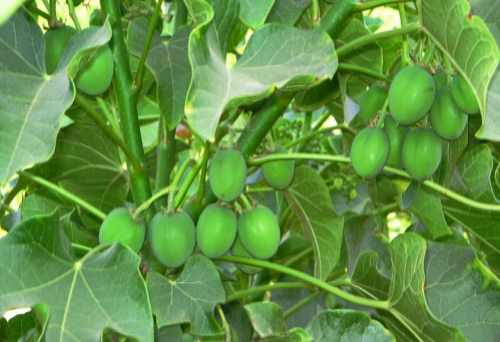
Jatropha’s Failure as a Biodiesel Feedstock Opens Opportunities in Rural Electrification
May 4, 2009 - Dave Harcourt - ecolocalizer.com
Only a few years ago Jatropha was considered to be the wonder biodiesel feedstock suitable for production by small scale farmers in poor soils and arid countries. It has not lived up to the hype and it will be years before it can compete agronomically with soya and it is not scalable to the refining industry’s needs under small scale farming. Small scale rural farmers are more easily integrated into Jatropha based electrification in underdeveloped rural areas.

The Jatropha Spin
Jatropha curcas, also known as the Physic nut, is a perennial poisonous shrub. It is an uncultivated non-food wild-species that grows easily in hedges and scattered around homesteads. It was spread from Central America to Africa by Portuguese traders who introduced it as a hedge material and a source of oil for light.
It can grow in poor soils and arid areas and as such does not compete with food crops. The seeds contain 27-40% oil that can be converted to a high-quality biodiesel fuel that can be used in a standard diesel engine.
These characteristics lead biodiesel refiners to conclude that Jatropha would be an ideal crop to establish in tropical and subtropical Africa, where it could be easily grown by small scale farmers. Hopefully, developing the rural areas while providing a cheap oil for the West’s biodiesel refineries.
This lead companies like D1 Oil into large investments in refining plant, which it eventually turned out was not viable and had to be sold off. It also resulted in euphoria, that swept through the system as the food for fuel debate intensified and the shortcoming of soya and cereal based biofuels became more evident.
The Reality Falls Short of The Spin
Vincnt Volckaerert presented a paper at the 4th Annual African Biofuels Conference in April 2009, describing D1 Oil’s plans to develop Jatropha cultivars that could produce the yields and oil contents necessary for biodiesel production. He very clearly stated that when Jatropha grows on arid and infertile ground the yields and oil content are are not acceptable. Growing Jatropha as a cultivated crop in fertile, irrigated land increases yeild and oil content but makes it more susceptible to pests.
He further noted that to date Jatropha has been grown from wild seeds or first generation selections based on limited trials. D1 Oils therefore formed D1 Oils Plant Science Limited (DOPSL) and is expecting to release second generation seeds with much improved characteristics in 2010 or 2011.
All this makes it inconceivable that Jatropha will offer small scale rural farmers any real opportunity to become the major supplier to the biofuels industry. Large well fertilised, irrigated and maintained plantations run by multinational commercial farmers will produce at a cost that farmer producing a few tons a year using inter-cropping will not be able to match.
So What are they doing in Mali
But there is still an opportunity to use existing Jatropha plants and to support an expansion in production by running pure vegetable oil (PVO) generators on Jatropa oil, to supply electricity to off-grid rural communities.
In Mali, where 99 % of the rural population lacks electricity, the Garalo project focuses on biofuel development based on Jatropha because village natural resources (land and Jatropha) are processed and used to provide energy security while keeping value addition in the communities. Inter-cropping with food crops limits the negative impact of Jatropha production on food security.
The system is based on the Garalo Jatropha Producers’ Cooperative which supports small scale farmers growing Jatropha and ACCESS, a private power company that provides a guaranteed market for the farmers. This structure was established with a grant from AMADER (a para-statal company in charge of rural electrification) and an international non-governmental organisation, the FACT foundation, but is designed to be able to run sustainably.
ACCESS has a capacity of 300 kW and a distribution network of approximately 13 km that currently supplies 247 households. Households pay for connection, consumption and make a contribution towards street lighting. The fact that payment defaults are under 10% indicates that there is a real demand for electricity in these rural areas.
It is projected that the demand will grow and allow the 600 ha currently cultivated to grow to 10,000 ha, which could supply all ACCESS’s fuel needs. ACCESS is already able to cover all its recurring costs from income, boding well for the business model to be replicated widely.
Photo Credit: By edwardyanquen on flickr under a Creative Commons license.

|



